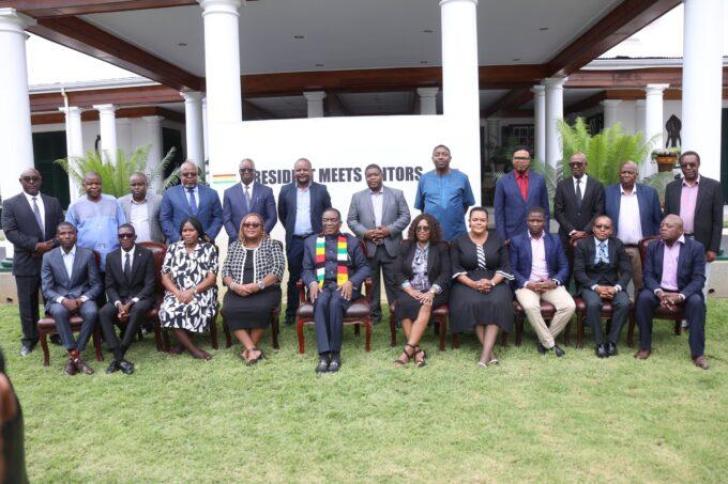News / National
Mnangagwa meets selected editors
17 Feb 2025 at 12:42hrs |
0 Views

President Emmerson Mnangagwa today held an interactive meeting with editors from public and selected private media houses, discussing his administration's achievements and strategic vision for the country.
The two-hour session, facilitated by the Department of Presidential Communications under Deputy Chief Secretary George Charamba, allowed the President to address questions on key national issues, including the economy, politics, and the media landscape.
Welcoming the editors to State House, President Mnangagwa acknowledged the diverse editorial approaches within Zimbabwe's media industry but emphasized their shared national identity.
"I want to warmly welcome you to State House. I do so mindful of the fact that this is our first meeting and that you represent different ownerships, editorial paths, and tendencies, which, in sum, constitute our national media industry," he said.
Despite these differences, he noted, the media remains crucial in shaping national discourse and informing the public on government policies and programs.
President Mnangagwa also acknowledged the shifting dynamics in the media industry, particularly the impact of rapid technological advancements on traditional journalism.
"The old media is dead, and with it, old models and ways of doing your craft. We feel the impact and repercussions of these changes of technologies even in our own sphere of Government, which is supposed to be stable and traditionally change-averse," he said.
He stressed the need for the media to adapt to evolving reader, viewer, and listener preferences influenced by digital trends.
Achievements of the Second Republic
Reflecting on his administration's achievements, President Mnangagwa highlighted milestones in infrastructure, mining, and agriculture, among other sectors. He reiterated the government's commitment to economic development, job creation, and improving livelihoods.
The engagement marks an effort by the government to foster dialogue with the media, as Zimbabwe navigates both economic challenges and opportunities in a rapidly changing global environment.
The two-hour session, facilitated by the Department of Presidential Communications under Deputy Chief Secretary George Charamba, allowed the President to address questions on key national issues, including the economy, politics, and the media landscape.
Welcoming the editors to State House, President Mnangagwa acknowledged the diverse editorial approaches within Zimbabwe's media industry but emphasized their shared national identity.
"I want to warmly welcome you to State House. I do so mindful of the fact that this is our first meeting and that you represent different ownerships, editorial paths, and tendencies, which, in sum, constitute our national media industry," he said.
Despite these differences, he noted, the media remains crucial in shaping national discourse and informing the public on government policies and programs.
"The old media is dead, and with it, old models and ways of doing your craft. We feel the impact and repercussions of these changes of technologies even in our own sphere of Government, which is supposed to be stable and traditionally change-averse," he said.
He stressed the need for the media to adapt to evolving reader, viewer, and listener preferences influenced by digital trends.
Achievements of the Second Republic
Reflecting on his administration's achievements, President Mnangagwa highlighted milestones in infrastructure, mining, and agriculture, among other sectors. He reiterated the government's commitment to economic development, job creation, and improving livelihoods.
The engagement marks an effort by the government to foster dialogue with the media, as Zimbabwe navigates both economic challenges and opportunities in a rapidly changing global environment.
Source - newsday
Join the discussion
Loading comments…































